Filter by
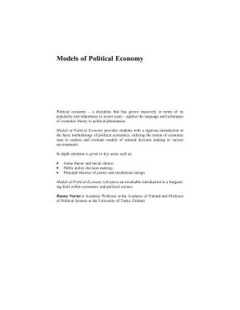
Models of Political Economy
Models of Political Economy will introduce students to the basic methodology of political economics. It covers all core theories as well as new developments including: decision theory game theory mechanism design games of asymmetric information. Hannu Nurmi's text will prove to be invaluable to all students who wish to understand this increasingly technical field.
- Edition
- -
- ISBN/ISSN
- 9780203358559
- Collation
- -
- Series Title
- -
- Call Number
- 650
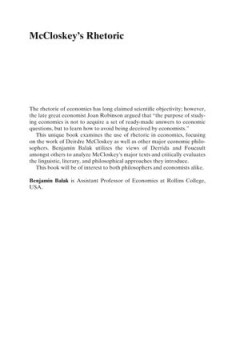
McCloskey's Rhetoric
The rhetoric of economics has long claimed scientific objectivity, however the late, great economist Joan Robinson argued that ‘the purpose of studying economics is not to acquire a set of ready-made answers to economic questions, but to learn how to avoid being deceived by economists.’ This unique book examines the use of rhetoric in economics, focusing on the work of Deirdre McCloskey and…
- Edition
- -
- ISBN/ISSN
- 9780203715116
- Collation
- -
- Series Title
- -
- Call Number
- 650
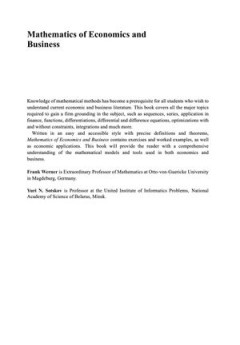
Mathematics of Economics and Business
For all students who wish to understand current economic and business literature, knowledge of mathematical methods has become a prerequisite. Clear and concise, with precise definitions and theorems, Werner and Sotskov cover all the major topics required to gain a firm grounding in this subject including sequences, series, applications in finance, functions, differentiations, differentials and…
- Edition
- -
- ISBN/ISSN
- 9780203401385
- Collation
- -
- Series Title
- -
- Call Number
- 650
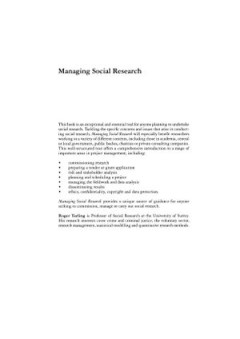
Managing Social Research
An essential tool for those planning to undertake social research, this exceptional book tackles many of the specific concerns and issues that arise. A well structured text, it offers a comprehensive introduction to a range of important areas in project management, including: commissioning research preparing a tender or grant application risk and stakeholder analysis managing the field work and…
- Edition
- -
- ISBN/ISSN
- 9780203001844
- Collation
- -
- Series Title
- -
- Call Number
- 650
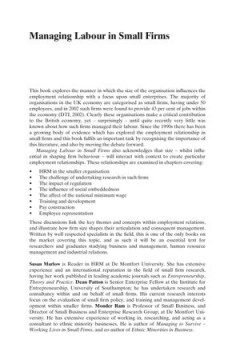
Managing Labour in Small Firms
The majority of employees currently working in the private sector are now employed in small firms, yet little is known about their working conditions. This collection of essays addresses this gap. Based on theoretical analysis supported by contemporary empirical evidence, the book explores key areas of the employment relationship adding a new perspective to our understanding of contemporary work.
- Edition
- -
- ISBN/ISSN
- 9780203495612
- Collation
- -
- Series Title
- -
- Call Number
- 650

Managing Development
Globalization in the 1990s provided both opportunities and challenges for developing and transition economies. Though for some, it offered the chance to achieve economic growth through active involvement in the integrated and liberalized world economy, it also increased their vulnerability to external shocks and volatility. As a consequence, stakeholders at every level of the development and tr…
- Edition
- -
- ISBN/ISSN
- -
- Collation
- -
- Series Title
- -
- Call Number
- -
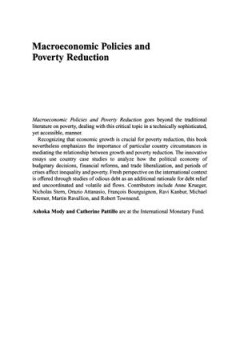
Macroeconomic Policies and Poverty
In this volume, world-renowned contributors, including Martin Ravallion, Michael Kremer and Robert Townsend, deal with the institutional characteristics of poverty resulting from the time pattern of aid, the nature of financial systems and the political economy of budgetary decisions. Going beyond the traditional literature on poverty, this original book deals with themes of broad interest to b…
- Edition
- -
- ISBN/ISSN
- 9780203005804
- Collation
- -
- Series Title
- -
- Call Number
- 650
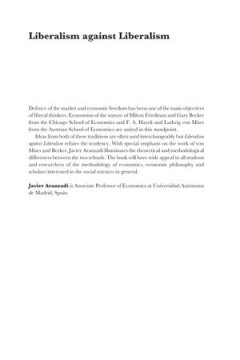
Liberalism against Liberalism
The defence of the market and economic freedom have been the main objectives of the investigations by liberal thinkers such as Milton Friedman, Gary Becker, F Hayek and L Von Mises. Bearing in mind that the first two economists are the maximum exponents of the Chicago School and the last two of the Austrian School, it is often concluded that the theories of both schools are similar. This book d…
- Edition
- -
- ISBN/ISSN
- 9780203016886
- Collation
- -
- Series Title
- -
- Call Number
- 650
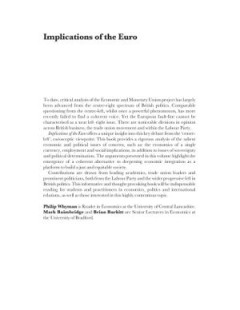
Implications of the EURO
To date, critical analysis of the EMU project has largely been advanced from the centre-right spectrum of British politics. Comparable questions from the centre-left have failed to find a coherent voice. Although, the European fault-line cannot be characterized as a neat Left-Right issue there are noticeable divisions in opinion across British business, the trade union movement and within the L…
- Edition
- -
- ISBN/ISSN
- 9780203695395
- Collation
- -
- Series Title
- -
- Call Number
- 650
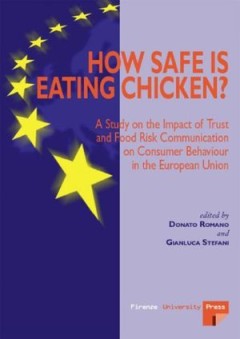
How safe is eating chicken? : A study on the impact of trust and food risk co…
Consumers trust is a key factor in dealing with rising concerns about food safety and food quality, but only few studies have dealt with consumer attitudes and none of them has tried to model the process of consumer response. This book reports the main findings of an european project aimed at analysing trust along the food chain and its relationship with food risk communication. The papers coll…
- Edition
- -
- ISBN/ISSN
- 9788864531090
- Collation
- -
- Series Title
- -
- Call Number
- 650
 Computer Science, Information & General Works
Computer Science, Information & General Works  Philosophy & Psychology
Philosophy & Psychology  Religion
Religion  Social Sciences
Social Sciences  Language
Language  Pure Science
Pure Science  Applied Sciences
Applied Sciences  Art & Recreation
Art & Recreation  Literature
Literature  History & Geography
History & Geography